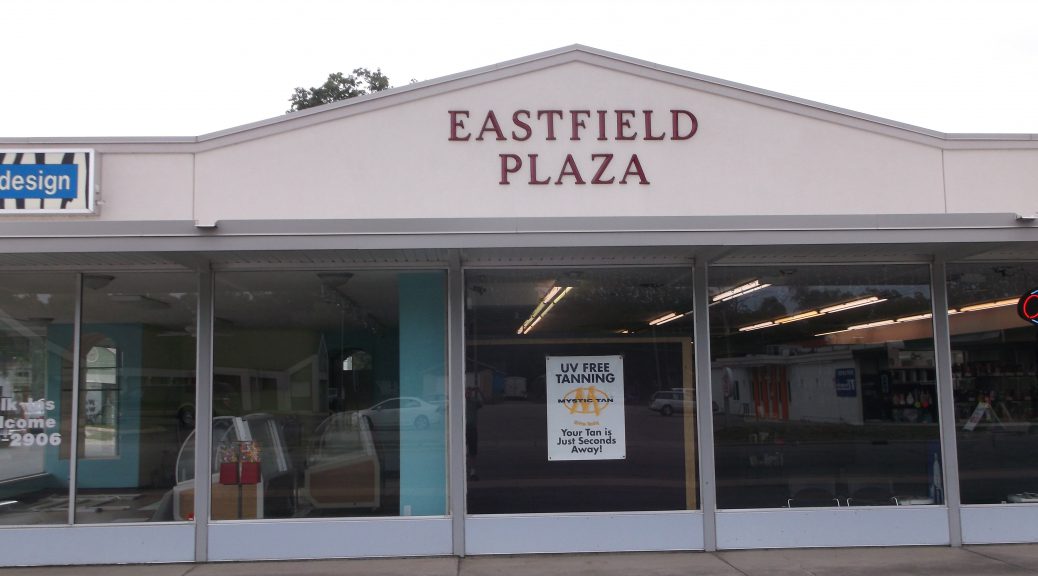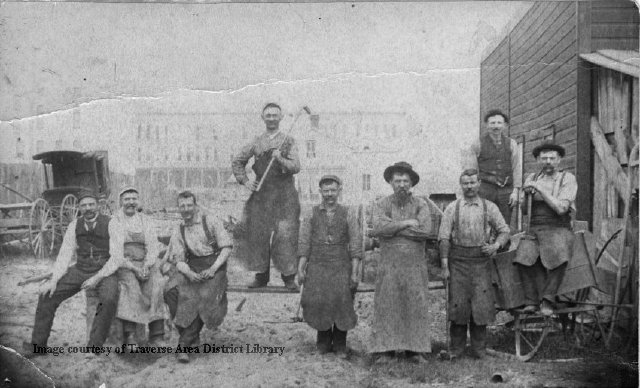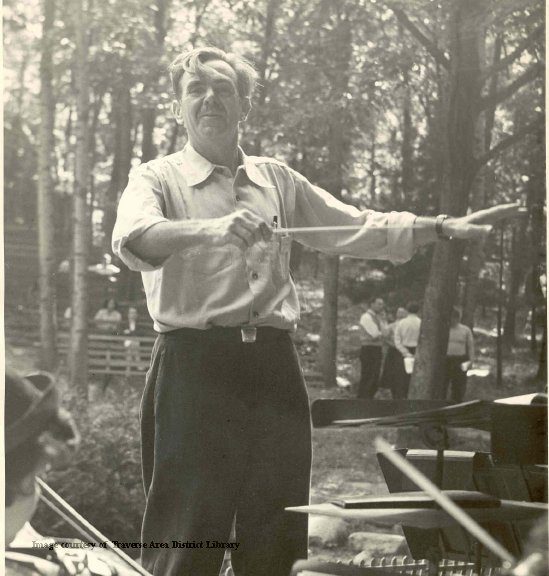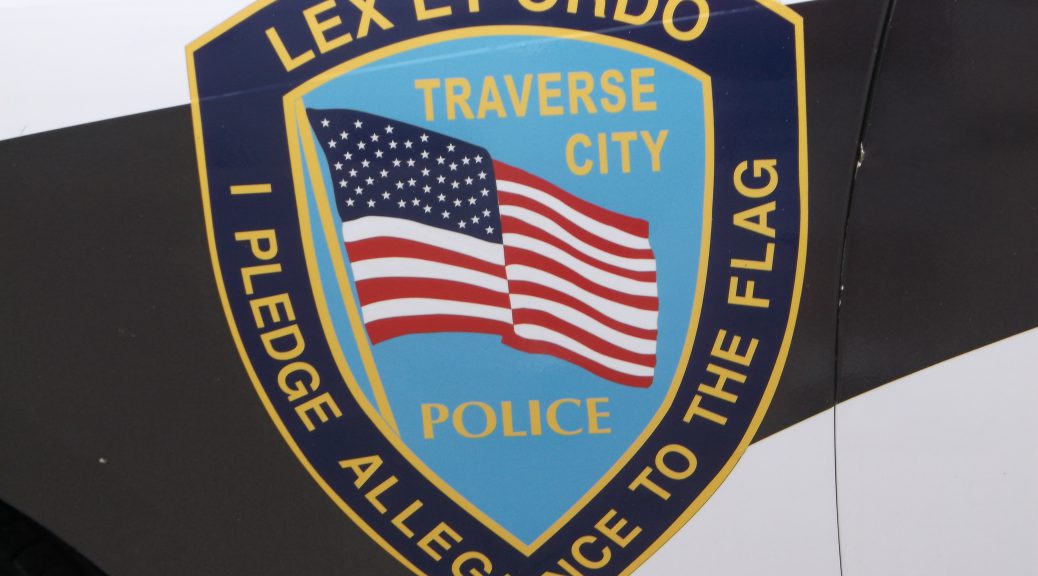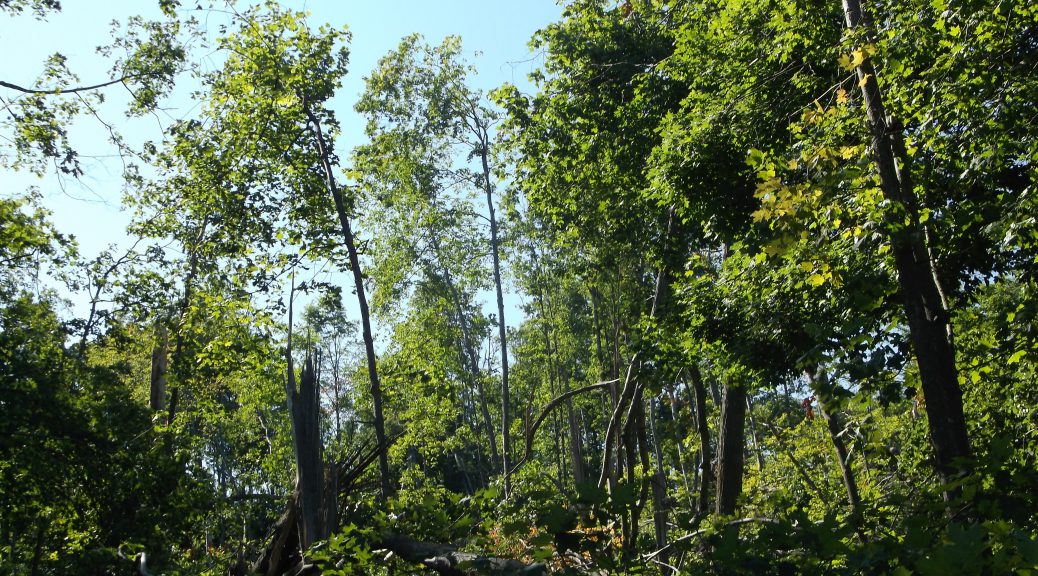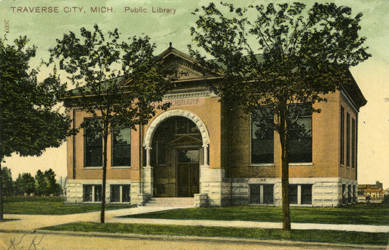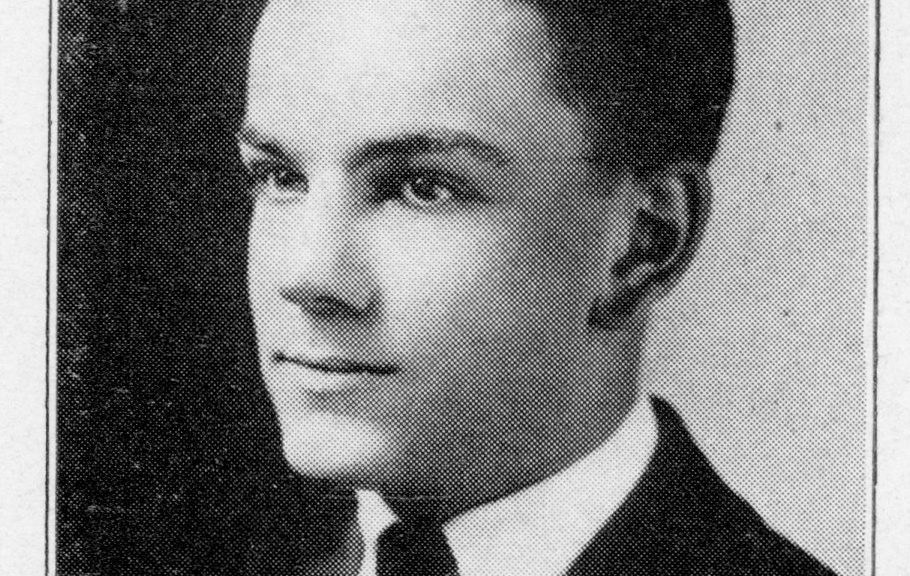This month’s mystery photo shows two views of the first strip mall in Traverse City. The name is clearly written on one of them—but where is it? Extra credit if you can name the decade in which it was built.

Monthly Archives: August 2016
(James) Vaclav Sleder, founder of Sleder’s Family Tavern
This excerpt comes to us from A Story of Traverse City, Michigan and some of the Early Settlers, written and illustrated by the artist Aldrich Farsky (yes, the Farsky featured in the May 2016 issue of Grand Traverse Journal). This was originally printed in Czech in 1908, in the national Czech publication Amerikan Kalandar. In 1977, Mr and Mrs. Edward Van Leishout and Mr. William E. Votruba translated the story in to English, which details the overseas immigration of the Czechs, as well as profiles a few of the more prominent Bohemain citizens of Traverse City, with an emphasis on their success. A copy is available for reading at the Traverse Area District Library, Woodmere Main Library.
One of the early settlers featured is (James) Vaclav Sleder, the man who would found the long-standing Sleder’s Family Tavern on Randolph Street:
“From his home, Cvrovic by Klatov in Czechy he emigrated to Traverse City when he was 32 years ol.d Things were not exactly as he had envisioned them to be. With his solid faith in the future and a great deal of hard work, he managed to bring his wife and sons Louis 9, Joseph 7, Andrew 3 and daughter Margaret to his new home.

Having been an apprentice in Wagon Working in Czechy he had found work in the Gramfort Wagon Works, but on arrival of his dependents he found a better position with the Petertyl factory. Here he stayed for 12 years. At this time he invested his savings in a new building which soon became the most favored saloon by all. On the 2nd floor he operated a dance hall and entertainment center. Because of his friendly personality and direct, honest and free thinking attitude, he was respected by everyone.

After running his business for 10 years Mr. Sleder turned the active management of the saloon over to his oldest son Louis, who continued his father’s practices and profited likewise. He enrolled his 2nd son in an engineering school and the youngest son entered the army for the duration of the war against Spain. It so happened he was discharged about the same time as the second son completed his schooling so finding himself with two fine sons to take over his other duties, Mr. Sleder began to devote his time to volunteer work and good deeds. It was on such a mission that he lost his life. A fellow C.S.P.S. [note: the Czech-Slovak Protective Society] member Mr. J. Ryant has [sic.] passed away and Mr. Sleder volunteered to notify people of his death and make arrangements for the lodge sponsored funeral. This was Dec. 17th 1905. His horse became frightened and ran away throwing Mr. Sleder out of his sleigh in such a manner that he was fatally injured.
After his death his three sons managed his business interests with such good judgement that everything prospered. They soon invested in a brewery which was remodeled, by son Joseph, (who had become a fine engineer), until it became a modern, well equipped and attractive as well as prosperous business, which permitted the three of them to own 2 of the 21 saloons in Traverse City at this writing with very good prospects of expanding still more in the future.
Certainly the 3 sons have proven that the good example their father set for them was not wasted.”
For a complete list of persons listed in this 49-page story by Farsky, see the catalog record at the Traverse Area District Library’s online Local History Collection.
August Events for History Lovers
Downtown Traverse City Historic Walking Tours begin in August
Don’t miss the Traverse Area Historical Society’s newest offering, our Downtown Historic Walking Tours! The first tour will be offered on Saturday, August 6th, starting at 10:30am. The tour will last approximately 90 minutes. Please meet in front of Horizon Bookstore, 243 East Front Street, 20 minutes before the start time. The cost is $10 cash or check; with all proceeds benefiting the Historical Society. Reservations (at 995-0313) are appreciated but are not necessary. Subsequent tours will be offered each Saturday of August. Information on Fall tours will be available at a later date.
Interlochen Center for the Arts History at Benzie Museum
“Historic Photos and Stories from the Interlochen Center for the Arts” by John and Margaret Beery at 7pm on Thursday, August 11 at the Mills Community House. The Berrys will share the dreams and vision, through photos and stories, of Dr. Joseph Maddy, founder of Interlochen Center for the Arts and examine the stories and personalities of such recognizable Interlochen folk as Aaron Copland, John Philip Sousa and Percy Granger. Margaret is the managing director of tours, and John has been on the Interlochen summer staff for 33 years and acts as curator of the Greenleaf Instrument Collection.
Concert to Celebrate 100 Years of National Park Service
 The National Park Service Centennial Band will be performing a concert to celebrate the 100th anniversary of the National Park Service on August 18 at 2:00 at the Traverse Area District Library, and at 7:00 at the Fountain Point Resort at Lake Leelanau. The band will perform songs related to National Parks around the nation. A family event, fun for all, so bring your kids, friends and neighbors! Click on the image (right) to see the full schedule.
The National Park Service Centennial Band will be performing a concert to celebrate the 100th anniversary of the National Park Service on August 18 at 2:00 at the Traverse Area District Library, and at 7:00 at the Fountain Point Resort at Lake Leelanau. The band will perform songs related to National Parks around the nation. A family event, fun for all, so bring your kids, friends and neighbors! Click on the image (right) to see the full schedule.
Making Waves: Michigan’s Boat-Building Industry, 1865-2000: Leelanau County Historical Society’s “Literature on the Lakeshore” program with Scott M. Peters
 On Saturday, August 20th at 4pm, join your friends at the Leelanau Museum for a nautical adventure! In this 2016 Michigan Notable Book, Scott M. Peters, Curator of the Michigan Historical Musuem, explores the intriguing story of Michigan’s Illustrious place in boat building that changed boating across the world.
On Saturday, August 20th at 4pm, join your friends at the Leelanau Museum for a nautical adventure! In this 2016 Michigan Notable Book, Scott M. Peters, Curator of the Michigan Historical Musuem, explores the intriguing story of Michigan’s Illustrious place in boat building that changed boating across the world.
At the Leelanau Historical Society Museum, 203 E Cedar St, Leland, MI 49654
WWII Veterans in Their Own Words: Leelanau County Historical Society’s “Literature on the Lakeshore” program with Larry Martin
On Thursday, September 1st at 5pm, Larry Martin will present the memories of Edgar Harrel, a marine aboard the USS Indianapolis. On July 30th 1945 the USS Indianapolis was hit by several torpedoes from a Japanese submarine. She sank in 12 minutes in the deepest part of the Pacific Ocean. There were 1197 men aboard and about 300 died during the sinking, putting about 900 men into the ocean. Hear Edgar tell what it is like to be lost at sea for about 112 hours.
In addition Larry will have several tables of WWII memorabilia on display! At the Leelanau Historical Society Museum, 203 E Cedar St, Leland, MI 49654
The Comedy of Crystal Lake with Dr. Daniels

The National Park Service at Sleeping Bear Dunes National Lakeshore (National Lakeshore) will host a special presentation and book signing event on August 5, 2016 at the Philip A. Hart Visitor Center in Empire, MI with Stacy L. Daniels, author of the book “The Comedy of Crystal Lake”. Dr. Daniels will present a program in the visitor center auditorium beginning at 10:00 a.m. followed by a book signing that will last until 1:00 p.m.
You might remember guest contributor to the GTJ and author Dr. Daniels. If you’ve missed his Archibald Jones impersonation in the past, now’s your chance! Your Editors still considers Daniels’ hefty tome to be well worth your time to read… what a story!
Dedication Service honors Dr. David Wilson Cousins, Union Veteran, Colored Infantry in Mayfield Township
 Although a bit late for this publication, Your Editors hope you will make the trek to Down Cemetery, to honor Dr. David Wilson Cousins, Union Veteran Company H 102nd Colored Infantry, and members of his family. Dr. Cousins was laid to rest 107 years to go, without the Veteran gravestone he justly deserves. Our good friends at the Grand Traverse Area Genealogical Society and Robert Finch Camp #14 Sons of Union Veterans of the Civil War have worked together to identify his resting place, and fund the erection of the grave marker. This event took place on Saturday, July 30, 2016 at 10am, Down Cemetery, County Road 633 and Harrand, Mayfield Township, Grand Traverse County. You may have missed the unveiling, but it’s never too late to honor our deserving veterans, and a cemetery is a pleasant place to enjoy a picnic with friends new and old.
Although a bit late for this publication, Your Editors hope you will make the trek to Down Cemetery, to honor Dr. David Wilson Cousins, Union Veteran Company H 102nd Colored Infantry, and members of his family. Dr. Cousins was laid to rest 107 years to go, without the Veteran gravestone he justly deserves. Our good friends at the Grand Traverse Area Genealogical Society and Robert Finch Camp #14 Sons of Union Veterans of the Civil War have worked together to identify his resting place, and fund the erection of the grave marker. This event took place on Saturday, July 30, 2016 at 10am, Down Cemetery, County Road 633 and Harrand, Mayfield Township, Grand Traverse County. You may have missed the unveiling, but it’s never too late to honor our deserving veterans, and a cemetery is a pleasant place to enjoy a picnic with friends new and old.
Reader Claims “Mystery Photo” Kudos for Police Insignia Dating
Two virtual cigars and a tip of the hat to Charlene for getting the answer right: Our research has shown that 1970 is the likely date that the “Lex et Ordo” phrase was incorporated into the insignia. However, we were unable to confirm that with the Police Department. We have found very few other instances of the phrase in continued use on police insignias, and regard Traverse City’s as a historical relic.
Well done, Charlene!
The Big Blow-down: How the Wind Storm of 2015 Affected Local Forests
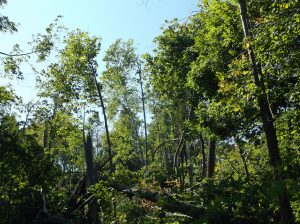
Anyone living in Northwest Lower Michigan within a region extending from Leelanau through Kalkaska counties, will not forget the big storm of August 2, 2015. It was one of those signature events that cause you to remember exactly where you were when it happened. I was on the phone with a friend: we talked nervously, wondering when the connection would go dead, all the while thinking we should both head for our separate closets in case the roofs of our homes should blow away. Trees bent the way you see them do in videos of hurricanes and trash containers became missiles driven by the wind. In fact, on the basis of observed damage, the wind speed did exceed that of a category 2 hurricane in places, more than 100 miles per hour.
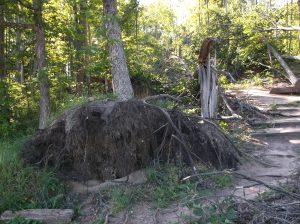
What do storms like that do to forests? Are there winners and losers in such a catastrophe? What effects can be observed after one, fifty, and a hundred years later? These are the questions that intrigued me as I walked through a devastated forest in Leelanau county, a few weeks after the Big Blow. Mostly, the trees tipped, though a few were broken off at the middle. Earthen mounds containing tree roots made walking difficult as you took circuitous routes to get to places that used to be reached directly. The uneven ground of mature forests is due to tipped trees, some brought down a century or more ago. That is one long-term consequence of the storm: the hills and valleys of the new forest could remain for centuries.
A hardwoods in Michigan is generally covered with last year’s un-decomposed leaves from last two or three years. Called leaf litter, it acts as a blanket, keeping moisture in and repelling the growth of small wildflowers, ferns, and other small plants. When the leaf litter is torn apart as it is when a tree tips over, opportunities abound for seeds waiting for their chance. They sprout and grow rapidly, their growth speeded by sunlight that touches the forest floor as tree canopies no longer provide shade. Along with natives, invasive plants like garlic mustard thrive in the disturbed ground. It is a changed habitat for all and those best adapted take advantage of their genetic heritage.
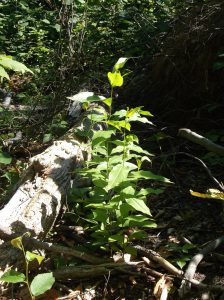
Certain trees win out in the competition for sunlight, casting others in shade as they overtop them. Shade intolerant trees grow the fastest—birch, black cherry, poplar red pine—while shade tolerant trees like sugar maple, American beech, and white pine bide their time in their shade. Before long, only the seedlings of those trees will dominate the forest floor, since only they can tolerate summers’ complete shade. Poplars and black cherry (together with scattered oaks and maples) will dominate the first generation of trees on the hilly moraines of Leelanau and Grand Traverse counties. In time, they will be replaced by hemlock, beech, and a more dense population of sugar and red maples.
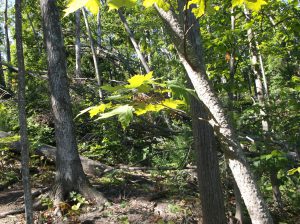
Naturally, a few middle-sized trees will survive a massive blow-down after a storm. After wind storm, with sunlight flooding in as the dense overhead canopy disappears, they respond to the changed conditions for growth. Buds under the bark spring to life, sending out small, leafy branches. Called epicormic sprouting, this phenomenon has serious consequences for those wishing perfect timber for logging, since the wood grain is interrupted by new vascular tissue that supplies the new branch. Look for epicormic sprouting in forests damaged by the August 2nd storm.
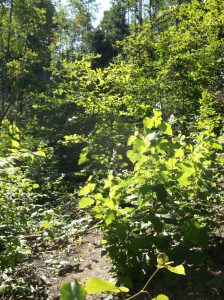
Secondary effects of a severe windstorm are too numerous to count. The loss of nests and dens that occupied old trees, the loss of stable food sources like acorns and beechnuts, the disappearance of animals that prefer the cool, deep shade of a mature forest (like land snails), and the opening of hilly terrain to erosion are four obvious ones, but even those only scratch the surface. Of course, the winners will move in—the deer that browse on shoots of poplar, ground squirrels, rabbits, blackberries and raspberries, and uncountable weed species—as the older residents die or move out. It is a scene that has been re-enacted for untold thousands of years.

Whenever something catastrophic happens in nature, we know it is wrong to take sides—since some living things require the housecleaning that enables them to thrive. At the same time, we cannot help but grieve for what has been lost. After all, isn’t a mature hardwoods rarer and more precious than acreage covered by poplar sprouts? Virgin timber is very hard to find in Northern Michigan: Ever since the nineteenth century loggers have destroyed those ecosystems without mercy. So it is that we feel a pang in our hearts when the big trees go down and the sunlight pours in. We know we have lost something that took centuries to form. The Big Blow damaged far more than human property. It destroyed a natural relic that is not easily replaced.
Letter from Andrew Carnegie to the People of Traverse City, 1902
119,487.
That is the estimated number of libraries in the United States today. If you are concerned about our national state of affairs, that should be a soothing balm. That is roughly 3.4 libraries per McDonald’s (just another fun fact to take with you to Party Banter Friday).
What do many of these libraries have in common, besides amazing librarians, piles of knowledge, and open and free access? Andrew Carnegie, the steel industrialist and philanthropist, who aided communities across our nation in building public libraries.
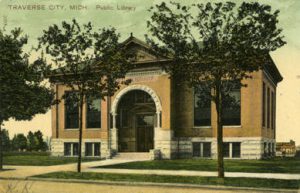
Our first community library in Traverse City was, although an amazing feat, not a free, public library. In 1869, the Ladies Library Association founded the first library in town, and in its earliest beginnings, men were barred from using its resources. A city library was in operation after that, but nothing on the physical scale of a Carnegie library.
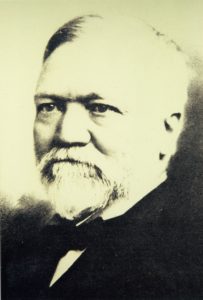
By all accounts, getting a Carnegie Library in your town was a relatively easy exercise. Interested parties would send Mr. Carnegie a letter, and if all looked well, he would reply back with instructions, usually requiring the city to promise an annual amount to the library’s upkeep. Between 1883 and 1929, 1,689 libraries were built across the United States. That is roughly 36 libraries every year, for 46 years. Imagine!
So, what did Traverse City’s letter look like from dear Mr. Carnegie? Fortunately, it was published in the local newspaper, The Morning Record, on April 14, 1902:
“New York, April 8, 1902
Mr. Leon F. Titus,
Traverse City, Mich.
Dear Sir- Responding to your communications:
If Traverse City pledges itself by resolution of councils to support a free public library at cost of not less than two thousand (2,000) dollars a year, and provides a suitable site, Mr. Carnegie will be glad to furnish twenty thousand dollars ($20,000) for the erection of a free public library building
Very respectfully yours,
Jas. Bertram,
Private Secretary”
How would that have compared with the current city library’s operational budget? In the previous year, the bulk of operating costs were appropriated by the city council ($1000), paid out of a city fund designated for the librarian, rent, and other expenses ($816). Also in that year was the sale of the West Side chapel, which $875 was raised to go toward the library. Finally, court fines ($157.55) and book fines ($14.75) brought up the rear, for a total of $2863.80 raised, and $2702.15 spent. The city was already paying over $700 more than Carnegie was asking to pledge.
The “suitable site” raised much more controversy than the money to be pledged, for who wouldn’t want a library in their neighborhood? Sites in the current Boardman neighborhood (which was then the “far east” side of town) were proposed, as well as a site on Cass Street offered by the Oval Wood Dish Company. The newly-elected Mayor, John R. Santo, devoted most of his inaugural message in May 1903 to the “graver problem… commonly known as ‘The Library Site.'”
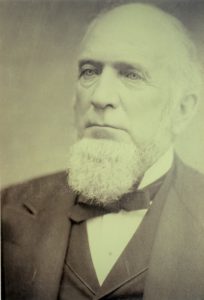
Santo certainly felt that the controversy was endangering other public works and business interests, largely by the City Council members whom he felt were “indulging in a spiteful controversy over the site for a building which we could well dispense with.” At the end of his speech, he recommended returning the Carnegie money and proposing the city find the funds itself, and if that proposal failed, then to erect the library at the Sixth Street location deeded to the City by Perry Hannah, and erecting a city hall building in the first ward (what we would consider downtown).
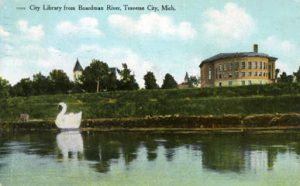
Perry Hannah’s offer of the site on Sixth Street won over the council, eventually. The Evening Record reported the hatchet “buried” by city council members Hamilton and Lardie, who “gracefully yielded at a special council meeting last night and declared that it is time that factional differences should be obliterated and the city be united instead of divided by ill feeling owing to differences of opinion as to the location of the Carnegie Library.” So the “long and bitter fight” came to an end almost a full year later, in March 1904.
Solidly and quickly the library was erected, furnished and stocked withe over 7000 titles. On opening day, February 28, 1905, 350 persons visited and checked out 390 books. In the first month, 3,042 books were given out. Care to guess what was most popular? Fiction dominated at 1,840, and juvenile fiction at 1,501, with history, biography, magazine, nature and travel following in the far distance (between 113 and 15 titles). How does that compare with today’s checkout stats? Find out more at the Traverse Area District Library’s Statistics Dashboard.
Amy Barritt is Special Collections Librarian at Traverse Area District Library, and co-editor of Grand Traverse Journal.
A Boy’s Diary, 1919: Life in Traverse City through the eyes of a 15-year-old
by Julie Schopieray, dogged researcher and regular contributor to Grand Traverse Journal
Recently the Traverse Area Historical Society received an email from a woman in Kalamazoo who, while visiting Traverse City, had purchased a “Boys Diary” at a local antique shop. After reading it herself, she wanted to donate the book to the History Center, only wanting in return any information on who the author of the diary might be, and what happened to him. We accepted her donation and I had her send the book to me. I was excited about the challenge of identifying the author.
The day it arrived I began to look for clues that might lead to who the young man was. There were no last names mentioned, only first names, and the parents were only identified as Mama and Dad. Starting at the first page, I jotted down every name mentioned. By the time I got to the March entries, I felt I had enough clues to take the names and compare them to the 1919 city directory. I entered only first names into the database and they all seemed to match well with one particular family. That along with a very important clue about a box of candy, I came to the conclusion that this diary belonged to someone connected with the Straub Brothers & Amiotte Candy Company. “The factory” was mentioned many times in the diary and when “a box of candy” was used in the same sentence, I knew I was on to something.
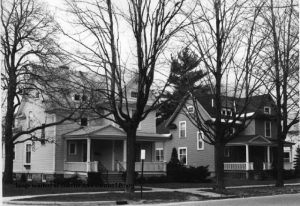
Next, I figured a birth year of the young man, taking the year (1919) and the fact that he was a freshman in high school and age 15, so assumed his birth year was 1903. When I looked at the Straub families listed in the 1920 census, I saw one who had a son, Robert, who was born around 1903. As I looked further in the database, I found a passport application for a Robert C. Straub, which listed his exact birth date– June 12, 1903. A-ha! I immediately flipped to the June 12 diary entry and saw he had written about all his birthday gifts. I had a perfect match! I was then able to connect all the first names mentioned to family members. Robert was the youngest of three children of Anton and Molly Straub. He was 8 years younger than his next sibling, Anton jr. “Tony”, and 11 years younger than his sister Helen. The Anton F. Straub family home was at 536 W. 8th st. Their house is a twin to the home of Anton Straub’s brother John, who lived next door.
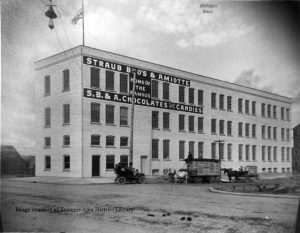
When Robert Straub received the diary on his 15th birthday in 1918, the first World War was still raging in Europe though there were some signs of peace. Many of the city’s young men were off serving in the armed forces and citizens purchased Liberty Bonds to support the cause. The influenza pandemic was affecting the entire country, and the local economy witnessed its first real hit the year before when the Oval Wood Dish Company, one of the town’s largest employers, packed up and moved out of town. The local labor movement made news due to complaints of low wages paid to the girls who toiled long hours in cigar and other factories. The Straub Brothers & Amiotte Candy Company factory on the corner of Front and Hall streets, was producing candy, marshmallows, and other confectionery delights at a high rate, but at very low pay to the mostly young women who staffed the factory. One account stated the owners had claimed that the factory could “get all the girls they wanted for $4 per week” when a living wage needed for the time was better than $15 a week. However, for the owners of the candy company, life was good.
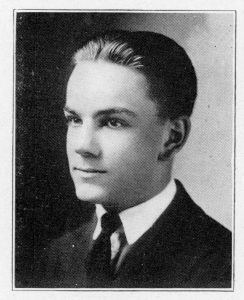
Robert Carl Straub, the youngest child of Anton and Molly Straub, faithfully wrote in his diary nearly every day for the year 1919. The following excerpts are a condensed version of the diary. It had been given to him on his fifteenth birthday in June 1918, from his cousin Irene and it starts the first of the following year. His handwriting is neat and easy to read. The life he describes tells the reader that he comes from a fairly well-off family. He is responsible, doing his daily chores and attending to his studies. He works on the school paper, plays basketball, participates on the debate team and does well in school, but as a young teen always seems to have time and money to spend on movies and fun with his friends. He loves ice cream and mentions it often. He even works on and drives the family auto around town, taking the family on errands and friends “out for a drive”. (14-year-olds could get a learner’s permit in Michigan in 1919. It was raised to 16 in 1937) The spelling is Robert’s. Notes in brackets are added by me to identify people and places mentioned.
January 1–Diary for the year 1919. Shoveled off walk in the morning… I find this is a pretty big page to fill with one days happenings. Got in bed at 15 minutes to two. Reason: went on a sleigh ride and had a11 o’clock supper at the church. Went to Wahl’s [a confectionery & ice cream store in the Lyric Theater building on Front St.] for first time in 1919. Also first sundaes.
More snow. Shoveled off walks. Fixed fire all day long. Went downtown in the afternoon and bought two records and a bottle of ink. Total bill $2.45. Also went to factory. Played Dad solitary in the evening and came out one to the good.
More of that junk you call snow, also more walks to shovel after I got up at 9:30. Went downtown in the afternoon and also went to the factory. Went to the show in the evening and saw George Walsh in “On the Jump”. He was mostly on the jump. Thus, another perfect day was ended when I began snoring.
School was to start today but it was posponed on account of the “flu”. That is hard luck in one way and good luck in another way.
Went downtown twice in the morning and once at night. Exchanged Kate’s wedding present and also took it to the house. Went skiing in the afternoon at the Golf Grounds. Got home wet and tired but all there. Had three dishes of Ice Cream today. Only bought one myself. Kate Wilhelm & Frank Turner were married. I had some bride’s cake and groom’s cake. Picture shows closed. Bowling allies closed. Some DEAD town. Darn the “flu.” Wahl’s open. Some lively place.
Went to the Commission Meeting after supper. Began at 8 p.m. and it let out at 10 p.m. Some time there. The whole commission better study up on parliamentary rule! Spent 25¢ for Ice Cream.
Fixed the fire and shoveled a little snow. I got a gallon of cider from Morgan’s. Went to the factory. Went downtown and spent 10¢ for a dish of Ice Cream. After supper Dad and I played solitary and I came out to the bad. Dad won ten games and I won six. Revenge is sweet… Some swell day. Sun was out and it (weather) was very warm for winter.
Joy! Joy! Joy! no snow to shovel. Dusted the dining room. Afternoon: Took a treatment from Miss Swan. [Sisters Lottie and Ella Swan ran a chiropractic office from their home at 247 Washington st.] Went downtown in the evening and walked up and down the street with Levi. Spent 25¢
…Put another coat of paint on our Bobs [bob sleds]. Then Levi and I went downtown. Had dinner and then we went skiing. No good. Very good sliding as we borrowed a couple of sleds and went sliding… After supper we put another coat of paint on the bobs and then five of us went sliding in the moon light. Great sport!…
Got up early and went over and got some “Liberty” Kraut. [during WW1 it was common for German-sounding foods to be renamed. Sauerkraut became “Liberty” kraut, etc.] Uncle Johns‘ were over for dinner. Mama took a treatment… We had the Edison fixed.
…wrote a letter to Helen. Made a aeroplane with my model builder…
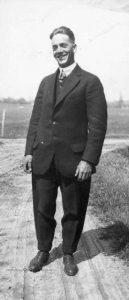
…Monday, no school… After dinner went downtown and had my hair cut, drew $1 out of the bank, payed Hamilton and Steinbergs. Bought Tony a pair of socks for his birthday. We all went over to Tony’s for his birthday supper…
Went to school all day. Aunt Lena came over for dinner and super and stayed all night. After school I wrote my last book review. Studied after supper… but could not sleep as they were playing the Edison all night long. A.A. meeting after school to disband all winter athletics. This semester will end February 15. No spring vacation and one extra week in June [all due to the flu outbreak].
After dinner, I took a treatment from Miss Swan. Then I took a letter to Uncle Mike and a package to the Red Cross Rooms. Then went downtown and to the factory. After supper, I shined Dad’s shoes and went to the dentist. Then I bought a pair of stockings and went to the show. Saw Tom Mix in “Fame and Fortune”.
Sunday morning went to Sunday School…After supper, I shaved my upper lip and went over to Irene’s.
Monday, went to school all day. After supper I played basketball at the church till 9:30 p.m. I handed the names of the scouts of Troop 1 to Geo. H. Curtis at noon.
Had a Algebra test and got my Physiology paper. Got 92. After school I came home and popped some corn and then studied until supper time. After supper I went to the Athenian Meeting. [debate team]
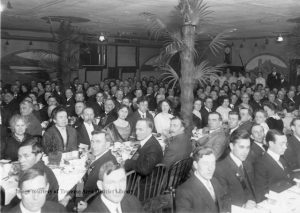
Went downtown after school and paid H. & L. Co. and Johnson Grocery bills. Went to the factory and came home with Dad at 5 p.m. Unusual event. [his father worked long hours and often evenings] …went to the Chamber of Commerce supper at the C.S. P. S. hall. Mama got a postal from Karl Umlor written in Germany.
Got to school before light and wrote my algebra test from 8 to 10 a.m. After 10 went to the factory and got a check and a box of candy which I took up to Dr. Martin. Had physiology final from 1-3…then went downtown and sent a Valentine to Helen and Grandma.
…Shoveled off the walk and carried out the ashes…went to the factory and got a box of candy and came home with Dad. Betty Gordon’s birthday…I gave her a box of candy. Walt Thompson and I went to the show at night and saw Arbuckle in “Camping Out”.
First day of school new semester. 1st hr. Mec. Drawing–Connell. 2nd hr. Geometry–Petertyl. 4th hr. Botany–Anderson. 6th hr. Caesar- Gordon. 7th hr. English–Eddy.
School all day. Played basket-ball after school at the Cong. Gym. “Red” Higgins is our coach.
Gave a book review. Went to the factory. Went to the basket-ball game after supper Results- Freshie 29, Sophomores 14. Went to Wahl’s after game. Spent 5¢. Won 10¢ on the game.
Mama’s birthday. Bought her a fern. Went to Athenian meeting after supper.
After school got a book at the library then came home and studied. Had Athenian picture taken at noon at Smith and Price.
Bought Irene a address book for her birthday…Night school after supper. Debate after night school. T.C. & Petoskey on “Minimum Wage” TC 0, Petoskey-3.
Went with Uncle John. He took his car out. Went downtown… put 3¢ in a slot machine & got out 15¢ at Wahl’s.
Did not go to S. S. [Sunday School] but helped work on the car. Got it all ready to take out. Went out riding with Uncle John, Tony, Evelyn & I. Shaved my upper lip.
Helped put paper together after school [school paper]. Went to freshman game…went to Grand Opera after game.
Went to factory & to West Side Bakery. Took a treatment.
Sunday [March 30] All clocks set ahead one hour. [Daylight Savings Time had started one year earlier]
Went downtown with the car…Athenian after supper. On debate- “Universal Language should be adopted” Negative 3 to 0. We won.
Had picture taken at Smith & Price after school. Dad & Ma went to Liberty Loan Mass Meeting at Opera House.
Got my picture proofs. Rotten!!! Sat over again for three more pictures. Dad took everybody to the show.
Went to S.S. Dad, Mama & I went to McCool’s Restaurant for dinner. Took Aunt Lote’s for a ride in the afternoon. Had ice cream for supper… after supper…had more ice cream.
Scout meeting after supper at Boardman. Julius Hanslowski is our scout-master.
Got my pictures. $6 a dozen. Harsch & I went out in the Asylum Wood for flowers after dinner.
Started on my eighth plate in Mech. Drawing. Harsch & I distributed Liberty Loan posters after school…
Went to school and gave Andy our flowers for botany. Everybody helped clean out the garage.
May 2- Got up at 4:45 a.m. and went fishing…at Asylum Creek. Got one trout.
May 10- Karl Umlor arrived in the city at 6:15 p.m and makes a swell officer.
Dad, Tony, Harsch and I went fishing to the Platte. Results: Dad-1, Tony-3, Harsch-0, Myself-1 (I caught the biggest fish of the bunch)
Got interest from my Liberty Bonds and put $2 in the bank.
[May 30] Memorial Day. Put flowers on soldiers grave…then came home for Dad & Mama and heard the ceremony at the cemetery. Marched in the parade…then went to T.C. vs. Boyne City basketball game.
Went to the club house after school. [Wequetong Club on the bay] bolled 97. Spent 35¢.
Had dinner at the Whiting….Took the folks to church at night and went riding with Uncle John. Had a puncture.[tire]
Athenian meeting was held at Dr. Houston’s house on the peninsula. I was elected president for the next semester.
June 12 [Robert’s 16th birthday– this is what a 16-year-old scout got as gifts in 1919!] Diary from Irene; a first aid kit from Helen; a sewing kit from Mrs. Kernan; $5 from Dad with which I bought a $3 pair of tennis shoes; a blanket from Mama and a canteen from Mike. Got 89 on Science final… 90 on English final… 95 on Algebra… Went to doctor and prepared for camp.
Botany final.. then finished my Mech. Drawing. Got 97 on my Geom. test. Caesar final…got 96%…school out at noon. Bought $8 camera …at Scott’s Drug Store.
Had a very good dinner at the Whiting Hotel. Took Dad to the ball-game after dinner then went riding. Had to change a tire and inner tube. Took Mama to church then went to the club.
[July 3] Went swimming at Aunt Alice’s cottage at East bay.
Went to the club house (Dad, Mama & I). Beat Dad 2 games of pool and went 50-50 at bowling.
[He Took a trip to visit his sister Helen’s in Chicago between July 8- Aug. 3]
Aug. 12. Went to see the circus unload…Saw the circus parade. Went to the show grounds & to the side show. Evening, took Mama, Aunt Lote & Virginia to the circus. Dad & I went to the show.
Aug. 20. Wreck on the P.M. R.R. near the poor house. We went out. I drove Anderson’s roadster back. Met Dad & went back to the wreck.
Sunday. Went to Hotel Pennington for dinner [In Interlochen]. Took Mama over to Tony’s & then went to the club. Spent 23¢.
Went to the club & to the factory. Went to Amiotte’s for supper. Stayed until 10:30 p.m.
Went to the Little Tavern for dinner then to Tony’s. Went to the club until 4 p.m.
Sept. 8 School all day. Went to the club after supper. Was elected president of the sophomore class!
Dad & Mama went to the Golf Club dinner Dance. I stayed home.
School all day… football game after school. Athenian after supper. Then went to the club but as no one was there, I came home.
The sophomore class was going to have a beach party at East Bay but as it rained, the party had to be held at Boardman school.
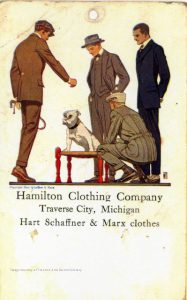
Bought a new suit with long pants at Hamilton’s. Some price! $45. Did some shopping.
Was going to take Mama and some ladies to the fair after school, but the car wouldn’t go…bolt on the battery was loose. Went to the fair after supper. [he went to the fair the next three evenings after school]
School all day. Received a wire that Grandma had another stroke. Ran errands after school. Went to court after supper Trace got fined for shooting a bird.
[Oct 10] School all day. Had dinner at school. Dad had two of his fingers cut off in the morning. I got excused from school early. Stay home at night. Evelyn came over and kept house for us.
Washed the dishes. Mr. Musselman came over to see Dad. Charley shaved Dad and the Dr. also came to fix his hands.
Put air and dis. water in the car. Went to the bank. Went to Dr.s with Dad after dinner.
School all day. Took Dad to the barber shop. Went over to Musselman’s after supper. Eleanor showed me how to dance.
Oct. 26 Turned the clocks back an hour…The Dr. came. Went to Aunt Lotes for supper. She had a faint and a gas attack.
School all day. Basketball after supper. Sophs 30, Faculty 28.
Went to S. S. Hung around Wahl’s all afternoon.
School in the morning. Out of school for armistice day in the afternoon.

Went to Manistee to see the football game. Went with Ted Johnson. Had two punctures.
No school. Went to the bank. Got $4.24 interest on Liberty Bonds. Went downtown & to the garage [had a flywheel put in the day before].
Thurs. Nov. 27 Thanksgiving. Tony’s & Uncle Max here for dinner. Played basket ball at night. Packed for my trip to Flint.
School till 7th hr. Then went to the M.E. church to decorate for banquet. Went to the football banquet. Got my saxophone.
Shoveled off the walks. Studied quite a bit. Went downtown in the afternoon… got 2 collars & a pair of mitts. Sent for 2 instruction books for my saxophone. Spent $2.04.
Fixed the fire. Tony came over and we blowed on the saxophone and then went downtown.
School all day. Downtown after school Show after supper. Had a bad storm. Spent 50¢.
Shoveled the walks. School all day. Gave my report. Athenian after supper.
Went to the dentist at 10 a.m. After dinner took the car to Petertyl’s to get it painted. Went to the bank for my Victory Bond and my Xmas saving club money. Went over to Boardman. Bowled 101 and 133.
School all day. Played my saxophone. The instruction book for it came today. Cold out. 10 below zero at 8 o’clock.
Went to the dentist. Bought all my Xmas presents. took my saxophone back to get it repadded. Got $2.71 interest on my Liberty Bond. Bowled 118, 120. Show after supper. Spent all together $16.50. Bought me a chemical outfit and a collar.
Thurs. Dec. 25. Christmas. Stayed around the house a while then we all went over to Kaufmans. Dinner at 2:30. then we took Mike to the train. Got a Saxopohne from Dad Sweater, gold cuff links, sheave holders from Mama. A knife from Helen & Mike, Two pair of socks from Tony & Evelyn, writing paper from Aunt Lote & Uncle Mike, a tie from Mrs. Kernen.
Went to… Giddings and played pool. Shoveled off the walks. Played basket ball at the Cong. all afternoon.
Had a early dinner and then went to the train with Helen. Went to the bank and downtown with Dad. Got $7.84 interest. Bowled 114, 135. Went to the Elks for supper and to their dinner dance and then went to the midnight show at the Lyric. Spent 31¢.
[Dec. 30, 1919] Thus this diary comes to a close after one successful year of keeping.
More research was conducted and I found out what this young man did after 1919. The summer following his high school graduation he went on a trip to Europe then attended the University of Michigan, graduating in 1926. He then moved to Chicago and started a business, the Robert Straub & Co., a sales promotion company. He married in the early 1930s, living and working in Chicago until 1972 when he and his wife moved back to Traverse City to retire. Robert died in 1998 and his wife in 2005. They had no children.
Julie Schopieray is a regular contributor to Grand Traverse Journal.

